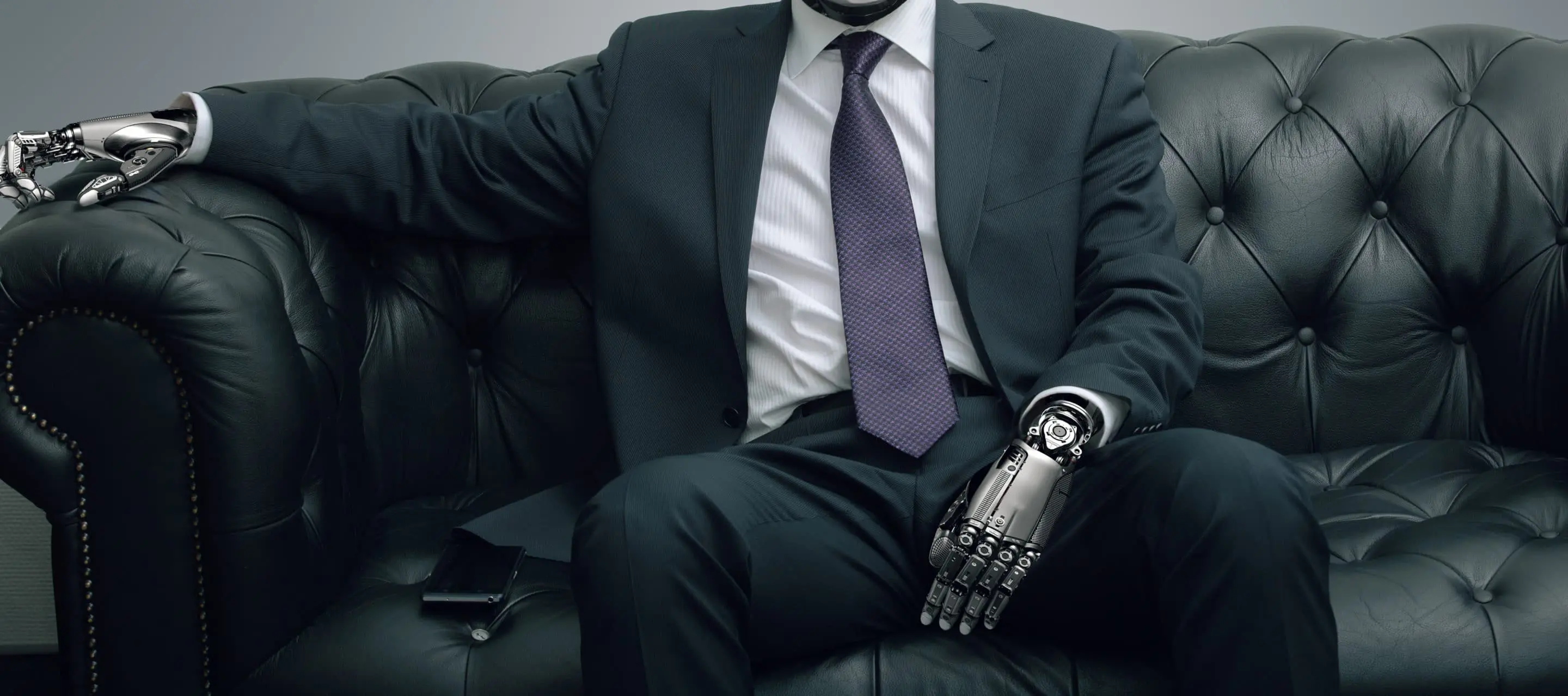You are not a machine.
You’re a living organism with purpose and feeling and irrational fuzziness.
You’re autopoietic, meaning that you renew and regenerate yourself.
You are sovereign in your subjectivity, an ecosystem unto yourself who’s dynamically, intrinsically interconnected with the universal macrocosm of life and mind.
Who and what you are can never be reduced to the collisions of subatomic particles and the forces that govern them because–at scale–you transcend the boundaries and knowledge of physics as we know it.
But why do we even need to be reminded of all this in the first place?
It’s a sign of the times.
Biohacking, or the process of using scientific experimentation and technology to optimize one’s biology, can be a beautiful thing when used consciously, but the term smacks of a broken paradigm, a philosophically impoverished worldview called ‘scientific materialism’ that was born out of the seventeenth-century belief that nature is a collection of mechanical objects rather than an integrated, dynamic living system.
Hackers control and dominate the computers they gain access to. They look for ‘exploits’ and use their technical prowess to bend systems to their will. Humans have been doing the same thing to nature for far too long, and it’s ruining the planet as well as our relationships with our bodies.
In this article, I’m asking a simple question: is ‘biohacking’ an appropriate term for supporting and improving living systems?
Before we get into it, however, let me assure you that I am not in any way anti-tech, anti-science, or even anti-biohacking per se. The point here is to shed light on the term itself and the maladaptive, fallacious worldview that it links back to.
I’m anything but a Luddite. In fact, I’m fascinated by technology and the breakthroughs in physiology that allow us to better understand and heal the human body. Being an integrative healthcare practitioner and medical philosopher though, I’m all too aware of the physical, psychological, and spiritual health implications of humanity’s misuse of, and obsession with technology.
Also, if you think I’m splitting hairs by arguing about whether a simple term like ‘biohacking’ needs to be called into question, I have one word for you: Kotodama.
In a Scientific American article titled ‘How Language Shapes the Brain’, the author states:
“Kotodama (“word spirit”) is the idea that words have an almost magical power to alter physical reality. Through its pervasive impact on society, including its influence on superstitions and social etiquette, traditional poetry and modern pop songs, the word Kotodama has, in a way, provided proof of its own concept. For centuries, many cultures have believed in the spiritual force of language. Over time, these ideas have extended from the realm of magic and mythology to become a topic of scientific investigation—ultimately leading to the discovery that language can indeed affect the physical world, for example, by altering our physiology.”
More on this later. For now, let’s take a trip back to the Renaissance, the birthplace of science as we know it, to shed some light on just how we got here and why a concept like biohacking seems so natural to us.
Pssst, if you feel like laughing right now, check out ‘Memes of Fire’, our collection of homegrown, 100% USDA Organic certified, GMO-free memes!
Biohacking Your Dog: Nature as Machine
In his book ‘Science Set Free’, biologist Rupert Sheldrake outlines the way that philosophers and scientists in the 1600s began to shift humanity’s conception of nature away from the vitalistic traditions and into a new metaphor of nature as mechanical.
In vitalism, all living organisms are thought to possess something akin to a soul and are endowed with life-force energy. This was taken for granted until European thinkers such as Kepler, Galileo, and Descartes began to use machine metaphors to refer to nature.
Sheldrake describes Kepler’s thoughts in the following passage:
“In 1605, Johannes Kepler summarized his program as follows: ‘My aim is to show that the celestial machine is to be likened not to a divine organism but rather to clockwork.’”
Being an astronomer, Kepler only applied this machine metaphor to the movements of the heavens, but Descartes applied it to the whole of nature:
“Descartes took the mechanical metaphor much further than Kepler or Galileo by extending it into the realm of life. He was fascinated by the sophisticated machinery of his age, such as clocks, looms and pumps…Just as Kepler projected the image of man-made machinery onto the cosmos, Descartes projected it onto animals. They, too, were like clockwork.”
Descartes’ belief in this mechanistic concept of nature was so unassailable that he was fully confident that doing unspeakable things to animals was no big deal, operating under the assumption that they were essentially machines and therefore had no feelings whatsoever.
And operate he did. Descartes was a biohacker in the most brutal, literal sense of the word, as he was known to cut up living dogs without anesthesia just for the sake of studying their anatomy.
Sheldrake goes on to say:
“Descartes’ doctrine seems to justify cruelty to animals, including vivisection, and it was said that the test of his followers was whether they would kick their dogs.”
So there you have it: the birth of dog-kicking scientific materialism.
Well, technically scientific materialism as we know it didn’t come until a bit later, but we might say that Descartes and his animal-kicking devotees planted the seeds from which it eventually sprouted.
Infatuated with their own mechanical creations, humans—in an attempt to see themselves as more like God—decided that God made machines too, and projected machinelike qualities onto living systems in order to suit their delusions of grandeur, blissfully ignoring the glaring differences between machines and lifeforms, such as self-determination, growth, regeneration, consciousness, and sovereignty.
Interestingly, there’s actually a term for this error in perception. It’s called mechanomorphism.

Mechanomorphism: How Organisms (and People) Became Machines
Just as anthropomorphism is the projection of human characteristics onto things that are not human, for example looking at a robot and treating it just like a friend, mechanomorphism is the projection of mechanical properties onto people and other living organisms.
Upon reflection, much of the language we use to talk about ourselves and other life forms is found to be mechanomorphic in nature, ‘biohacking’ being a prime example.
In the hyper-synthetic, human-fabricated milieu of the early 21st century, in which we’re ensconced in an ever-glowing, ever-beeping nest of electronic devices—safe from the unpredictability and messiness of Gaia and all her chaotic vicissitudes—mechanomorphism has been fully normalized.
The vast majority of the time, we’re surrounded by things made by humans: objects with impossibly perfect right angles bearing precision-machined stainless steel parts that are easily replaced, and finishes that resist degradation from even the hungriest of nature’s flora, those microbes gifted with the biochemical ferocity to break down and recycle nearly everything…until humans showed up, that is.
Think back to the last couple of weeks. When was the last time you heard a machine-based metaphor used to describe a living organism?
Did you ‘fuel up’ this morning to prepare for the day? Has someone told you they could see the ‘gears turning’ in your head when you began to understand a complex idea? Have you ever felt pride when someone told you that your team was a ‘well-oiled machine’?
Of course, whatever’s most prominent in the environment will always be a convenient substrate for metaphor-making. We can be certain that primitive peoples probably said things like “my brain is a fire” when they felt excited or angry. And modern life is beset by machinery, so it’s only natural that we would use so many machine metaphors to describe ourselves and other living organisms.
Seen at face value, using mechanistic terms like ‘biohacking’ to refer to living systems may seem thoroughly benign, but language profoundly impacts the way we think, feel, and behave, and there’s more going on here than meets the eye.
Remember Kotodama.
In the book ‘Words Can Change Your Brain’, the authors state that, “a single word has the power to influence the expression of genes that regulate physical and emotional stress.”
Language affects us much more deeply than we care to admit.
To wit, here’s a story about the famous linguist, Alfred Korzybski:
“One day, Korzybski was giving a lecture to a group of students, and he interrupted the lesson suddenly in order to retrieve a packet of biscuits, wrapped in white paper, from his briefcase…he asked the students on the seats in the front row if they would also like a biscuit. A few students took a biscuit. “Nice biscuit, don’t you think,” said Korzybski, while he took a second one. The students were chewing vigorously. Then he tore the white paper from the biscuits, in order to reveal the original packaging. On it was a big picture of a dog’s head and the words “Dog Cookies.” The students looked at the package, and were shocked. Two of them wanted to vomit, put their hands in front of their mouths, and ran out of the lecture hall to the toilet. “You see,” Korzybski remarked, “I have just demonstrated that people don’t just eat food, but also words, and that the taste of the former is often outdone by the taste of the latter.”
Language is psychoactive. Language is edible. Words are spells, and so how we talk about something…is everything.
So again, I ask the question: do we really want to be ‘biohackers’?
A Slippery Slope
There’s an unconscious tendency for humans to lose themselves in their infatuation with their own scientific and technological breakthroughs and hubristically assume that they’re smarter than nature.
In other words, we can get so caught up in admiring our tools and techniques that we fail to recognize just how little we still know about how Gaia walks and talks, and thus can get overconfident regarding our ability to safely and effectively improve upon her designs.
The belief system we have unwittingly inherited from several hundred years ago has led us to deny certain aspects of nature which cannot yet be measured, such as consciousness, life force, and other fuzzy ideas that ancient people have come up with due to their deep connection with her.
In that same vein, here’s a beautiful quote from Biologist and Futurist Elisabet Sahtouris::
“If science did not deny consciousness and intelligence in nature, things would look very different. We could no longer see nature as an array of resources for human use…We humans would not be in full control and our technological solutions to problems would often come into question…people are turning in droves to traditional forms of growing food and healing by hands-on body work—“shamanic healings” and herbal remedies that often come from indigenous people’s knowledge. All these forms of healing respect the intelligence of the body to heal itself with minor assistance from natural sources rather than dramatic technological interventions.”
Biohacking can take many forms, from the relatively benign practices of nutritional and sleep optimization to more questionable practices, such as implanting microchips and hard drives.
For those who are geared more toward the latter examples, it can be a gateway to something a shade darker.
Transhumanism vs. Team Humanism
Transhumanism is the ultimate destination of the biohacking ethos, as it relies upon the idea that we can most dramatically improve our biology by fully merging with machines and becoming virtually indistinguishable from them.
To those of us who are awake enough to doubt the narrative that merging with the synthetic is both inevitable and beneficial, something like transhumanism is extraordinarily unappealing if not downright sickening.
Personally, I find the idea literally nauseating (which I’m sure Korzybski would find amusing).
If you’re one of the people who’s a big fan of the notion that humans will soon enough merge with machines, and machines will become so intelligent and autonomous that they may as well be people, then I’m particularly impressed if you’re still reading this article, as you’re probably as disgusted with my arguments as I am with transhumanism.
Statistically speaking though, it’s far more likely that you’re either on the fence or in my camp on this issue.
What camp am I in, exactly? Or better yet, what team am I playing for? The best way I could explain it would be to borrow a phrase from eminent media theorist Douglas Rushkoff: ‘Team Human’.
In his video ‘Why ‘upgrading’ humanity is a transhumanist myth’, Rushkoff shares the following argument with his usual distinctive passion and cogency:
“The only ones out there who think they know what human consciousness is are computer engineers. If you talk to actual brain researchers and neuroscientists, they say, we’re nowhere close. We don’t even know for sure what goes on in a single square centimeter of soil. We’re still trying to teach agriculture companies that the soil is alive, that it’s not just dirt that you can put chemicals on. It’s a living matrix. If we don’t even know what a single centimeter of soil is, how do we know what the human brain is? We don’t. We don’t know what the source of consciousness is. We don’t know where we come from. We don’t even know if there’s a meaning to this universe or not. Yet, we think that we can make a simulation that’s as valid as this?”
Powerful words.
He goes on to share an anecdote about how he came up with the phrase ‘team human’ while chatting with a transhumanist:
“I was on a panel with a famous transhumanist, and he was arguing that it’s time that human beings come to accept that we will have to pass the torch of evolution to our digital successors. And that once computers have the singularity and they’re really thinking and better than us, then we should really only stick around as long as the computers need us, you know, to keep the lights on and oil their little circuits or whatever we have to do. And then, after that, fade into oblivion. And I said, hey, no, wait a minute. Human beings are still special. We’re weird. We’re quirky…You know, we deserve a place in the digital future. And he said, oh, Rushkoff, you’re just saying that because you’re human. As if it’s hubris, right? Oh, I’m just defending my little team. And that’s where I got the idea, all right, fine, I’m a human. I’m on Team Human.”
What to Be Instead of a Biohacker
Admittedly, I don’t have the perfect alternative nomenclature for ‘biohacking’ or ‘biohacker’. And don’t get me wrong. I thought about it. A lot.
Half-baked terms that are infinitely less catchy and interesting swirled through my mind, like ‘bioharmonizer’ and ‘biophile’. Although I might consider applying those to myself under certain circumstances, I doubt they’ll be catching on anytime soon.
At the end of the day, though, what really matters isn’t whether you use the term or not. It’s whether you use it consciously. I have no desire to treat biohacking like it’s evil or try to expunge it from the lexicon as if it were some kind of racial slur.
We all enjoy using techniques to support our physiology and improve our quality of life. Humans have been doing this for millennia. Ayurveda, Chinese Medicine, and countless indigenous cultures have been systematically studying the body in their own ways, according to their own methods, which are often just as valid as those of modern science.
The difference is that they had not yet created a landscape of the synthetic that allowed them to isolate themselves from nature and replace her with their own tech.
They were still immersed in her seasons, her soil, and her enchanting fractal geometries. This isn’t to say, of course, that ancient people had it all figured out or that humans have not evolved in endless ways in the last several millennia. It’s not about worshipping the past.
If there’s anything I’d recommend you be instead of a biohacker, it would be this: be a human who is in love with biology and all its curious creations. Be a humble student of life to the best of your ability, and always admit the limitations of your knowledge. Live in the reality of the mystery of existence.
The problem with the scientific materialist and transhumanist perspectives is that technology has become their golden calf, their precision-quantified, predictable, deterministic substitute for the enigmatic, mystical, inscrutable spiritual dimensions.
Such a disconnection from the mystery can only result in calamity, as humility is thrown completely out the window.
A New Singularity
Just what are we doing to ourselves spiritually and bioenergetically with all this technology?
If you’re the kind of person who doesn’t believe in chakras, meridians, or the notion that consciousness is anything more than an epiphenomenon of the brain, then these questions are irrelevant. Whether the tech you develop will affect these things is of no consequence because they’re all just figments of the primitive imagination.
For those of us who have access to states of consciousness that confirm the existence of these things, or at least the possibility of their existence, these questions are of extreme importance.
Transhumanists speak of ‘the singularity’: the point at which machines will become more intelligent than humans, and we’re thus forced to merge with them in order to remain relevant, achieving a kind of pseudo-immortality as we inevitably upload their consciousnesses onto silicon.
But, if you believe in the idea of some kind of etheric self, whether you call it ‘spirit’, ‘soul’, or anything else, you may—like me—find this idea preposterous for a number of reasons, among them that it relies on the fallacious assumption that intelligence is the most critical element in our survival and evolution, overshadowing things like wisdom, compassion, and creativity.
I propose an alternative singularity.
Let’s call this the ‘singularity of human technospiritual equivalence’ and define it as the point at which humans have reached a critical mass of psychological, emotional, ethical, and spiritual maturity that enables us to responsibly create technology not only for the good of all of humanity, but also the good of all life on earth and beyond.
Unlike Kurzweil’s singularity, which is predicted to happen in about 25 years, this one may take a bit longer, but I think we have a good shot at it, as people are waking up and old paradigms are falling apart at record speed.
So in conclusion, hack away at anything and everything…your biology, your beliefs, your relationships. Experiment. Fool around. Have fun.
But remember: Gaia was here first, and we’re nowhere even close to grokking her exquisite complexity, so stay humble and do your best to respect the mystery of life, because that’s the real way forward.
That’s the attitude that will usher in the singularity we actually need.






